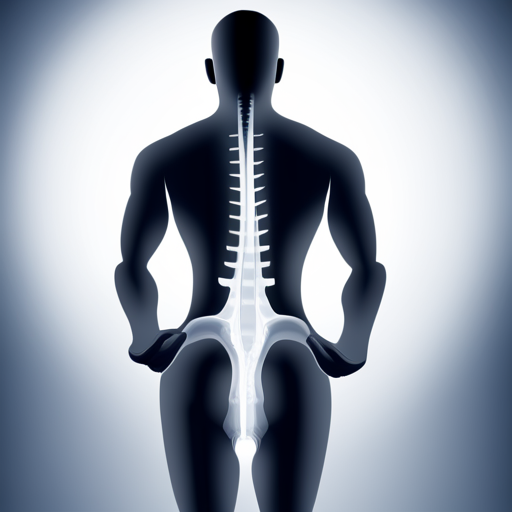Have you ever wondered how your weight can affect the health of your spine? It may come as a surprise, but there is a strong link between the two. Your weight can significantly impact your spinal health, and it’s essential to understand how to manage it effectively.
Maintaining a healthy weight is crucial for the well-being of your spine. Excess weight puts additional stress on the spine, leading to various issues such as herniated discs, degenerative disc disease, and even chronic back pain. By managing your weight, you can reduce the strain on your spine and minimize the risk of these problems.
Preventing spinal issues related to weight starts with adopting healthy habits. Incorporating regular exercise into your routine and following a balanced diet can help you shed those extra pounds and improve your spinal health.
If you’re already experiencing spinal health issues caused by weight, don’t worry. There are ways to manage them effectively. Physical therapy, pain management techniques, and lifestyle changes can all contribute to alleviating the discomfort and restoring your spinal health.
In this article, we will explore the impact of weight on spinal health and provide practical strategies for managing it. By making long-term changes to maintain a healthy weight and prioritize spinal health, you can enjoy an active and pain-free life.
Key Takeaways
- Excess weight can lead to spinal conditions such as herniated discs and degenerative disc disease, causing chronic back pain.
- Regular exercise and a balanced diet are crucial for maintaining a healthy weight and promoting spinal well-being.
- Physical therapy, pain management techniques, and lifestyle changes can help alleviate discomfort and restore spinal health.
– Surgical options may be necessary in severe cases, but weight management is still important for long-term spinal health.
Understanding the Link Between Weight and Spinal Health

Understanding the link between weight and spinal health isn’t just about numbers on a scale, but about recognizing the profound impact excess weight can have on the well-being of your spine.
When you carry extra pounds, it puts added stress on your spine, which can lead to pain, discomfort, and even serious spinal conditions. That’s why weight management strategies are crucial for maintaining a healthy spine.
By engaging in regular exercise, you can strengthen the muscles that support your spine, improve flexibility, and promote overall spinal health. Exercise doesn’t have to be complicated or intense; even simple activities like walking or swimming can make a big difference.
So, if you want to keep your spine healthy, it’s important to manage your weight and incorporate exercise into your daily routine.
Moving on to maintaining a healthy weight for spinal health…
Maintaining a Healthy Weight for Spinal Health

To maintain a healthy spine, you should strive for a body weight that allows you to move freely and effortlessly, like a well-balanced feather floating gracefully on a gentle breeze. Achieving and maintaining a healthy weight is crucial for spinal health. Here are three ways weight loss and exercise benefit your spine:
- Reduced pressure: Losing weight can alleviate the pressure on your spine, reducing the strain on your vertebrae and discs. This can help prevent spinal issues like herniated discs or degenerative disc disease.
- Improved flexibility: Regular exercise and weight loss can increase your flexibility, making it easier for your spine to move and bend. This can reduce the risk of muscle imbalances and stiffness that can lead to back pain.
- Enhanced muscle strength: Exercise helps build strong muscles that support your spine. Strengthening your core and back muscles can provide stability to your spine, preventing injuries and promoting good posture.
By focusing on weight loss and exercise, you can prevent spinal issues related to weight and maintain a healthy spine.
Preventing Spinal Issues Related to Weight

Imagine effortlessly gliding through life, free from the burden of spinal issues caused by excess weight. Preventing weight gain is an essential step in maintaining a healthy spine. By incorporating regular exercise into your routine, you can manage your weight and reduce the strain on your spine.
Engaging in activities such as walking, swimming, or cycling can help burn calories and strengthen your back muscles. Additionally, focusing on a balanced diet that includes nutritious foods can help you maintain a healthy weight. By making small changes such as portion control and choosing healthier options, you can prevent weight gain and protect your spine.
Transitioning into the next section, managing spinal health issues caused by weight involves specific strategies that can provide relief and improve overall well-being.
Managing Spinal Health Issues Caused by Weight

If you’re experiencing spinal health issues caused by weight, it’s important to seek medical treatment for any existing conditions you may have. This can help alleviate symptoms and prevent further damage to your spine. Physical therapy and rehabilitation can also be beneficial in managing spinal health issues, as they can help improve your strength, flexibility, and overall function.
In severe cases, exploring surgical options may be necessary to address the underlying issues and provide relief.
Seeking Medical Treatment for Existing Spinal Conditions
When seeking medical treatment for your existing spinal conditions, it’s important to consult with a qualified healthcare professional. They can provide personalized recommendations tailored to your specific needs. They will consider your circumstances and help you explore medical alternatives or holistic approaches to manage your condition effectively.
A healthcare professional can offer valuable insights and expertise to help alleviate your symptoms and improve your spinal health. They may suggest treatments such as medication, injections, or surgical interventions if necessary. Additionally, they can guide you in making lifestyle changes, including adopting a healthy diet and exercise routine. These changes can contribute to managing your weight and reducing the strain on your spine.
Transitioning into the subsequent section about physical therapy and rehabilitation for spinal health, your healthcare professional may recommend these therapies as part of your treatment plan.
Physical Therapy and Rehabilitation for Spinal Health
Embarking on a journey of physical therapy and rehabilitation can drastically improve your overall well-being and restore your body’s strength and flexibility. Here are three key benefits of physical therapy:
- Pain relief: Physical therapy can help alleviate pain caused by spinal conditions by using techniques such as hot and cold therapy, electrical stimulation, and manual therapy. These methods target the root cause of the pain and provide long-lasting relief.
- Improved mobility: Through targeted exercises and stretches, physical therapy can increase your range of motion and restore movement in affected areas. This can help you regain your independence and perform daily activities with ease.
- Preventing future injuries: Physical therapy not only treats existing spinal conditions but also focuses on preventing future injuries. Therapists educate you on proper body mechanics, posture, and ergonomics, reducing the risk of further damage.
By incorporating physical therapy and rehabilitation techniques into your treatment plan, you can experience these benefits and improve your spinal health. Transitioning to the next section, exploring surgical options for severe cases, can provide additional options for those who require further intervention.
Exploring Surgical Options for Severe Cases
Now, let’s talk about what to do when things get really serious with your spinal health. In some severe cases, physical therapy and rehabilitation may not be enough to alleviate your pain and improve your condition. That’s when surgical options come into play.
Surgery is a way to fix the problems in your spine by directly addressing the underlying issues. It can involve procedures like spinal fusion, artificial disc replacement, or decompression surgeries. Surgical options can be effective in reducing pain and improving mobility, but they also come with risks and a longer recovery time. It’s important to have a thorough discussion with your healthcare provider to determine if surgery is the right choice for you.
However, keep in mind that surgery alone isn’t a cure-all. Weight management is still crucial for long-term spinal health.
So let’s move on to the next section and learn about long-term strategies for maintaining a healthy weight and spinal health.
Long-Term Strategies for Maintaining a Healthy Weight and Spinal Health

Maintaining a healthy weight plays a crucial role in ensuring optimal spinal health throughout your life. To help you achieve and maintain a healthy weight, here are four simple strategies:
- Follow a balanced diet: Focus on consuming a variety of nutrient-rich foods, such as fruits, vegetables, lean proteins, and whole grains. Avoid processed foods and sugary drinks.
- Incorporate regular exercise: Engage in physical activities that you enjoy, such as walking, swimming, or cycling. Aim for at least 150 minutes of moderate-intensity exercise per week.
- Monitor portion sizes: Be mindful of the amount of food you eat. Use smaller plates and learn to recognize hunger and fullness cues to avoid overeating.
- Seek support: Consider joining a weight loss program or working with a healthcare professional who can provide guidance and support on your weight loss journey.
By adopting these long-term strategies, you can not only maintain a healthy weight but also promote the health of your spine.
Frequently Asked Questions
What are the common symptoms of spinal issues caused by weight?
Excess weight can cause weight-related spinal symptoms like back pain, stiffness, and limited mobility. These issues can make it difficult for you to perform daily activities and enjoy life.
Can losing weight help alleviate back pain?
Losing weight can help reduce back pain. When you lose weight, it puts less strain on your spine, which can alleviate discomfort. Weight loss benefits your spine by reducing pressure and improving overall spinal health.
Is there a specific diet or exercise routine that is recommended for maintaining a healthy weight and spinal health?
To maintain a healthy weight and spinal health, it’s important to develop healthy eating habits and do exercises that focus on your spine, like yoga or pilates. Keep it simple and take care of your body.
Are there any alternative treatments or therapies available for managing spinal health issues caused by weight?
Alternative therapies, such as acupuncture treatment, can be used to manage spinal health issues caused by weight. Acupuncture involves inserting thin needles into specific points on the body to help alleviate pain and improve spinal alignment.
How long does it typically take to see improvements in spinal health after losing weight?
How long does it take to see improvements in spinal health after losing weight? Well, the improvement timeline varies due to factors like starting weight, overall health, and adherence to a healthy lifestyle.
Conclusion
In conclusion, it’s important for you to maintain a healthy weight in order to protect your spinal health. By keeping your weight in check, you can prevent spinal issues and manage any existing problems. Remember to engage in regular exercise and eat a balanced diet to achieve and maintain a healthy weight.
One interesting statistic to consider is that studies have shown that losing just 10% of your body weight can significantly reduce the amount of stress on your spine. So, make the effort to manage your weight for a healthier spine.
